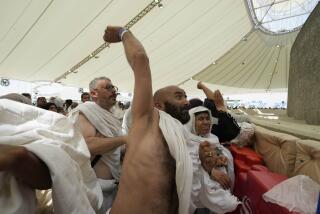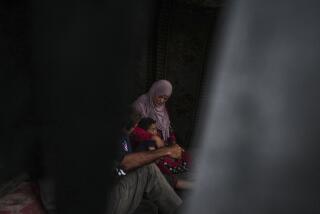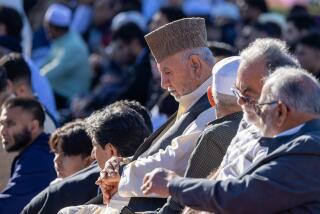A Month of Sacrifice Is Observed--From Sunup to Sundown : For Muslims During Ramadan, It’s Either Feast or Famine
- Share via
CAIRO — A strong wind gusted across the river, rippling the surface with flecks of silver in the last light of day. Ragged gray clouds passed swiftly overhead, like balls of steel wool scraping their way across the sky.
The clouds cast a shadow over the outdoor table where the men were seated, talking in low, almost hushed tones. There were 12 of them there, and there was something vaguely conspiratorial about their demeanor, about their quick, furtive glances, their obvious impatience.
Every now and then they looked at their wristwatches, as if urging the hands forward to the appointed time.
Cries From the Mosques
Then came the signal for which they had been waiting. For a moment they sat rigid and silent, listening to the cries from the mosques across the river Nile-- “Allahu akbar, Allahu akbar (God is great).”
Then, rising abruptly, they turned and strode swiftly across the courtyard, toward a man in a white suit who waited for them at the far end. They carried knives, forks and spoons, and they looked hungry. The maitre d’ handed them plates, and they quickly began heaping them with grilled lamb, chicken, stuffed grape leaves, salad and sweets from the long buffet table.
Iftar, the nightly “breakfast” that follows a day of sunup-to-sundown fasting during the Muslim holy month of Ramadan, had begun.
Celebrated for 14 Centuries
All across the Muslim world, from the jungles of Malaysia to the deserts of Saudi Arabia, similar scenes are being repeated nightly. Ramadan, which began in Egypt this year on April 29, commemorates the time nearly 14 centuries ago when, according to Muslim belief, God revealed the first verses of the Koran to the Prophet Mohammed.
Reckoned by the lunar calendar, the month begins when the first sliver of the new moon appears, and it continues until the crescent reappears some 30 days later. During this period, Muslims are expected to abstain from food, drink, cigarettes and sex during the daylight hours, beginning, as the Koran instructs, when a “white thread can be distinguished from a black one” in the light of dawn. Only sick people, pregnant women, travelers and soldiers at war are exempt from these restrictions.
In theory, Ramadan is a period of piety and praying, of sacrifice and charity toward the poor. In some countries, however, what is preached is not always what is strictly practiced.
In ultraconservative societies like Saudi Arabia, Koranic injunctions are followed to the letter--at least in public. But in more open societies like Egypt, self-denial during the day is usually compensated for by overindulgence after dark. Indeed, Ramadan during the evening is a bit like Thanksgiving or Christmas in the West--a time for feasting and family get-togethers.
Punctuality is not known to be an Egyptian trait, but the iftar feast beginning at sundown is one occasion when it is inexcusable to be late. In Cairo, a single volley from a cannon atop Saladin’s ancient citadel signals the start of the feast and, as the word is spread from district to district via neighborhood mosques, 15 million Egyptians, utensils in hand, sit down to an evening meal that usually lasts for hours.
Overnight Shift
During Ramadan, virtually the entire country goes on an overnight shift. People leave work early, take long naps, get up for iftar and then stay awake until 3 or 4 in the morning, when they sit down to sohour, an early-morning meal before sunrise. Then they nap for a few more hours before arriving at their offices bleary-eyed and late.
“You learn to pray that nothing breaks down during Ramadan, because if it does, it won’t get fixed,” a Western businessman said. “Nothing gets done during Ramadan, and nobody works.”
“It’s like the ‘Night of the Living Dead,’ ” another foreign resident said. “For the whole month, my secretary is a zombie.”
The strains of daytime fasting, of not eating, not drinking heavily sweetened tea and not smoking cigarettes--pleasures elevated to the status of national pastimes in Egypt--take their toll on the characteristic geniality of Egyptians. Although statistics are hard to come by, most Egyptians would readily agree that there are more quarrels during Ramadan, more fistfights and more traffic accidents than at other times of the year.
Indeed, a Cairo newspaper once complained that Ramadan had become “synonymous with a short temper, apathy, insolence, daylong yawning, doing less work and, if possible, none.”
Despite the resurgence in recent years of Islamic fundamentalism, that state of affairs has not changed much.
Humor Eases Hardships
The pious still preach against the commercialization of Ramadan, noting that the Prophet Mohammed broke his fast in the evenings with only dates and water. But the majority of Egyptians--and this has always been their genius--still find ways of softening their hardship with good humor, with an innate ability to enjoy themselves and a keen eye for any excuse to do it.
“Look, I am as religious as most men,” said one of the diners plunging into his iftar feast at the outdoor restaurant on the Nile. “But who says that if we have to suffer, we can’t at least enjoy it?”
More to Read
Sign up for Essential California
The most important California stories and recommendations in your inbox every morning.
You may occasionally receive promotional content from the Los Angeles Times.










